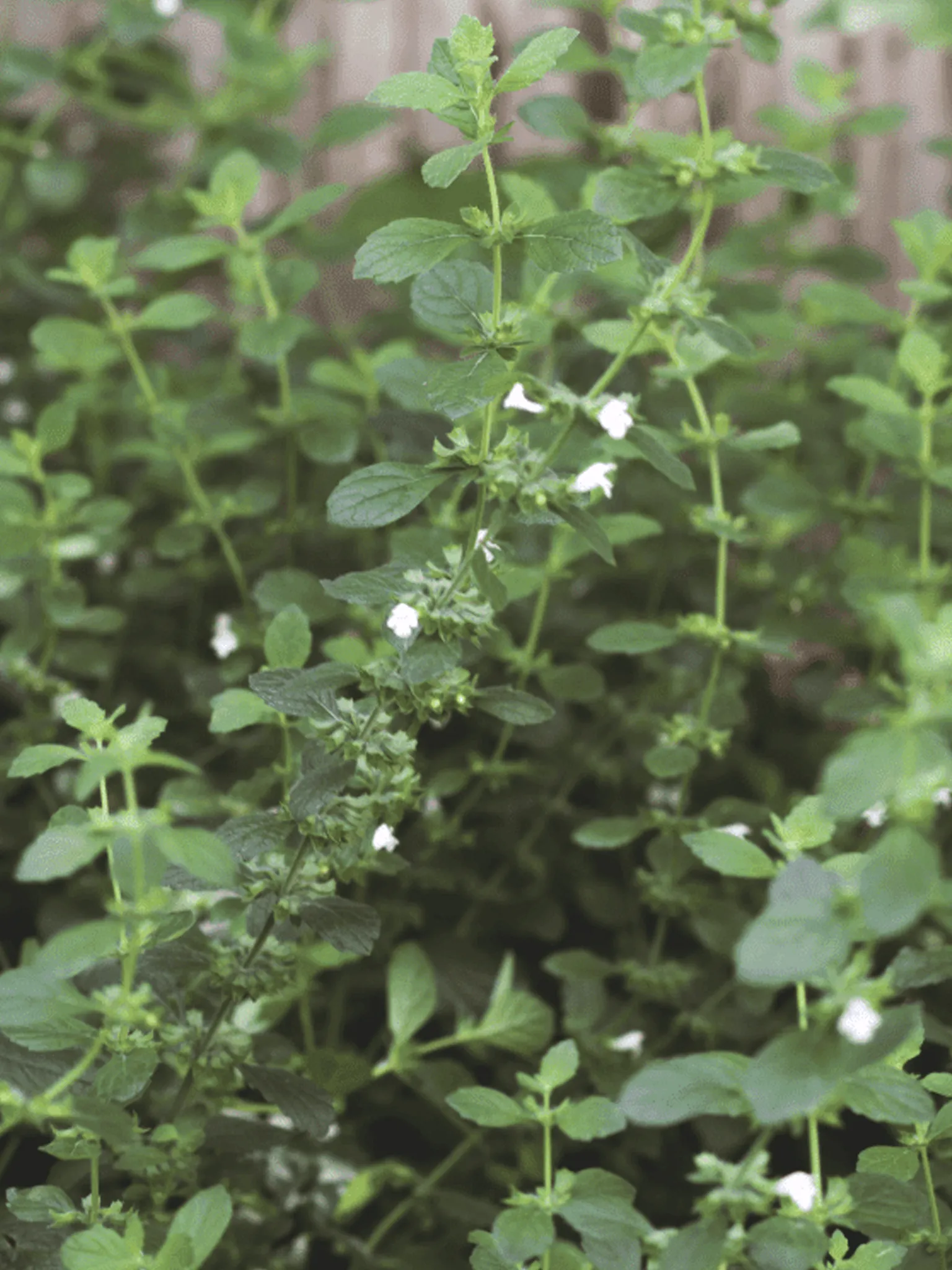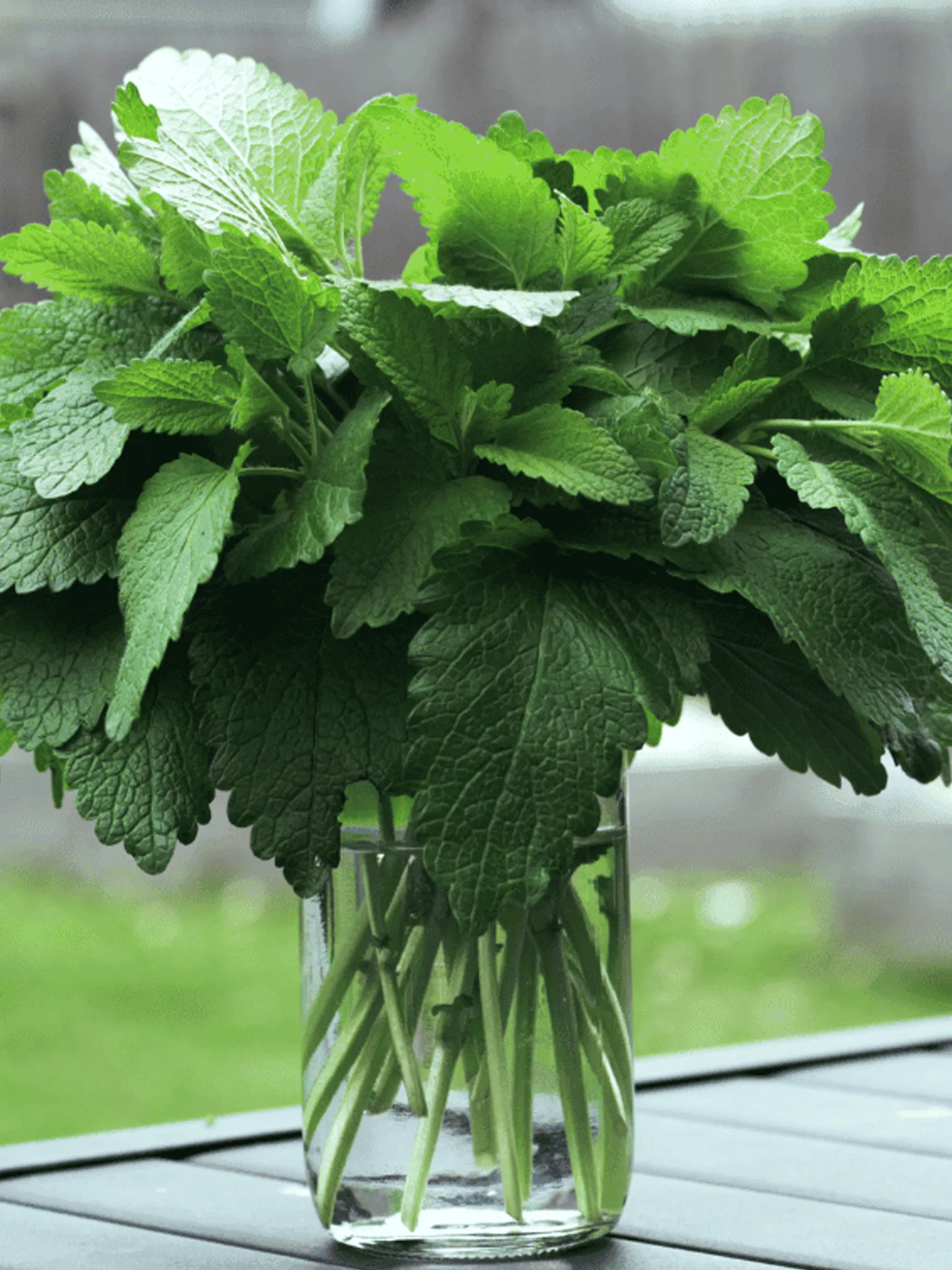Lemon balm is part of the mint family and can help with insomnia, mild depression, and stress. I use this tincture during particularly difficult and stressful times. I take it with a glass of water to help with sleep and anxiety.
Tinctures are liquid extracts made from herbs that have been steeped in alcohol for an extended period of time. They’re a popular way to take herbal remedies because they’re easy to use and can be stored for several years. Take tinctures on their own or added to drinks. They’re also highly concentrated, meaning that a small amount can be very effective.
Learn how to grow lemon balm from seed
Overview

The recipe involves combining fresh lemon balm into a high-proof alcohol for tincturing. The extraction takes about 4-6 weeks.
Equipment Needed
- Glass jar with a tight-fitting lid, sterilized
- Cheesecloth or a fine-mesh strainer
- Funnel
- Amber glass dropper bottle
Ingredients
- 1 part fresh lemon balm leaves and stems
- 2 parts high-proof alcohol (such as vodka or grain alcohol)
Instructions Summary
- Harvest: Harvest your lemon balm in the late morning when the leaves are dry. Wash them thoroughly to remove any dirt or debris. You can use the leaves, stems, and flowers in your tincture.
- Prep: Sterilize your mason jar and make sure it’s completely dry before adding the lemon balm. Chop the cleaned lemon balm into fine pieces. Add it to the sterilized jar, filling it about two-thirds full. Pour the alcohol over the lemon balm, making sure to cover it completely. The ratio of alcohol to lemon balm should be roughly 2:1 (for example, 2 cups alcohol to 1 cup chopped lemon balm ).
- Store: Place the jar in a cool, dark place and let it sit for about 4-6 weeks. Shake the jar once a day to mix everything around.
- Strain: After four to six weeks, strain the tincture using a cheesecloth and a fine-mesh strainer. Squeeze the lemon balm in the cheesecloth to extract all of the liquid. Use a funnel to transfer the tincture into amber glass dropper bottles. The amber glass will protect the tincture from light and help to preserve its potency.
- Long-term storage: Label the tincture with the date and the name of the herb. Store it in a cool, dark place. A tincture can last for several years if stored properly.
Lemon balm seeds from seedsnow.com
How to sterilize your mason jar or glass jar
- Wash the jar with hot soapy water and rinse thoroughly.
- Boil water in a large pot.
- Once the water is boiling, carefully lower the jar into the pot.
- Let the jar sit in the boiling water for about 10 minutes to sterilize it.
- Use tongs to remove the jar from the boiling water and place it on a clean towel or drying rack.
- Let the jar air dry completely or dry it with a clean towel.
Join Our Newsletter
Sign up for our monthly newsletter to get easy gardening tips, seasonal to-dos, and herbal recipes delivered right to your inbox.
Thank you!
Check your email to confirm your subscription.
How to Use Lemon Balm Tincture
It’s always best to consult with a qualified healthcare practitioner or herbalist who can help you determine the appropriate dosage based on your individual needs. However, here are some general guidelines for adults using a lemon balm tincture:
- For general relaxation and stress relief: Take 2-3 milliliters (about 40-60 drops) of lemon balm tincture up to three times per day. This can be added to a small amount of water or taken directly under the tongue.
- For sleep support: Take 2-3 milliliters (about 40-60 drops) of lemon balm tincture about 30 minutes before bedtime. This can be added to a small amount of water or taken directly under the tongue.
- For digestive support: Take 2-3 milliliters (about 40-60 drops) of lemon balm tincture before or after meals to support healthy digestion.

Note: This information is general and for educational purposes only. Your personal health and dosing should be determined by you and your healthcare provider.
Contraindications of Lemon Balm
Lemon balm is considered generally safe for most people when consumed in reasonable amounts, there are a few things to keep in mind:
- Hypothyroidism: Lemon balm may interfere with thyroid function and should be avoided by people with hypothyroidism or other thyroid conditions.
- Sedative medications: Lemon balm has sedative properties and may enhance the effects of sedative medications, including benzodiazepines and barbiturates.
- Glaucoma: Lemon balm may increase intraocular pressure and should be avoided by people with glaucoma.
- Pregnancy and breastfeeding: There is not enough research to determine the safety of lemon balm during pregnancy and breastfeeding. It is recommended that pregnant and breastfeeding women avoid lemon balm or consult with a healthcare professional before using it.
- Allergies: Some people may be allergic to lemon balm and may experience symptoms such as itching, rash, or difficulty breathing. If you are allergic to other members of the mint family, you may be more likely to be allergic to lemon balm as well.
Join Our Newsletter
Sign up for our monthly newsletter to get easy gardening tips, seasonal to-dos, and herbal recipes delivered right to your inbox.
Thank you!
Check your email to confirm your subscription.













